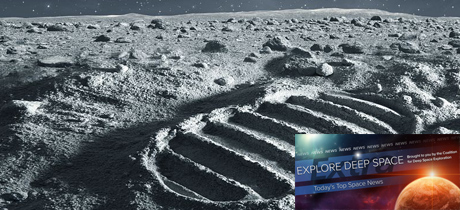In Today’s Deep Space Extra… A 2021 U.S. Senate NASA authorization measure calls for the development of more than one Human Landing System. NASA’s Space Launch System core stage performed well during the Green Run series that concluded in March, according to an analysis of terabytes of test data.
Human Space Exploration
Senate bill would direct NASA to select a second HLS company
SpaceNews.com (5/12): A NASA authorization bill for 2021 was added to the Endless Frontier Act legislation by the U.S. Senate Commerce Committee on Wednesday. The amendment calls on NASA to select not fewer than two providers to develop a Human Landing System (HLS) for the Artemis program no later than 30 days after the bill is enacted. Earlier this year, NASA selected one of three proposals it had chosen in 2020 for initial development, though the agency’s original intent was to select at least two proposals to ensure redundancy. SpaceX was chosen over proposals from teams led by Blue Origin and Dynetics. The two companies have appealed the award. Wednesday’s amendment authorizes just over $10 billion for the landers, which would have to be appropriated by Congress.
SLS Core Stage Green Run validates propulsion system performance and modeling
Coalition Members in the News – Aerojet Rocketdyne, Boeing
NASAspaceflight.com (5/11): The core stage of NASA’s Space Launch System (SLS) rocket spent most of 2020 at NASA’s Stennis Space Center undergoing evaluations that concluded with a full duration hot fire test of the four RS-25 rocket engines on March 16. The hardware was moved to NASA’s Kennedy Space Center (KSC) for the unpiloted Artemis I test flight planned for late this year, while vast amounts of test data were analyzed. So far, assessments of terabytes of data indicate the core’s performance during the test firing was as anticipated.
Russian-U.S. group to discuss likely causes of air leak aboard orbital outpost
TASS of Russia (5/12): Representatives from Russia’s Energia Space Rocket Corp. and NASA will meet in late May to discuss the cause and status of small air leaks detected in the Russian segment of the International Space Station (ISS) and addressed with repairs by Russian cosmonauts in March. The meeting will take place at Energia. (Editor’s note: TASS is a Russian government-owned news source).
Space Science
NASA’s Voyager 1 detects faint, monotone hum beyond our solar system
Cnet (5/12): In a paper published in the journal Nature Astronomy this week, researchers examined data sent back by Voyager 1’s Plasma Wave System over its journey, particularly after it passed through the solar system’s border. “We’re detecting the faint, persistent hum of interstellar gas,” said Stella Ocker, a doctoral student at Cornell University who led the research. “It’s very faint and monotone, because it is in a narrow frequency bandwidth.” For almost one billion miles, Voyager 1 could hear the monotone drone and the researchers believe these weak plasma waves are different from other detections made in the vast nothingness of interstellar space.
Other News
Ariane 5 issue could delay JWST
Coalition Member in the News – Northrop Grumman
SpaceNews.com (5/12): Ongoing work to address a problem seen on two previous Ariane 5 launches has kept that launch vehicle grounded for months and could delay the high-profile launch of NASA’s James Webb Space Telescope (JWST) later this year. In a statement to SpaceNews.com, Arianespace acknowledged that “post-flight analyses conducted on two recent Ariane 5 launches have indicated the occurrence of a less than fully nominal separation of the fairing, however with no adverse impact on the Ariane 5 flights in question.”
Senate Commerce Committee again approves SPACE Act
SpacePolicyOnline.com (5/12): The Senate Commerce, Science, and Transportation Committee yesterday approved the Sen. Roger Wicker-proposed SPACE Act again as part of an amendment to the Endless Frontier Act. The Endless Frontier Act is supported by a number of Democrats and Republicans and is designed to ensure U.S. technological leadership by investing in innovation to compete with China. With the backing of Senate Majority Leader Chuck Schumer, the bill has a higher chance of being considered and perhaps passed by the full Senate than other legislation, making it a target to add proposed measures that otherwise might fail to reach the floor. The SPACE Act adopted yesterday as part of the amendment to the Endless Frontier Act appears to be the same as the version of that bill that cleared the Commerce Committee last year.
Senate Intelligence chairman wants further review of decision to relocate U.S. Space Command
SpaceNews.com (5/11): U.S. Sen. Mark Warner, chair of the Senate Select Committee on Intelligence, has endorsed efforts by a Colorado colleague, U.S. Sen. Michael Bennet, in challenging the decision in early January to relocate the leadership of the U.S. Space Command from Peterson Air Force Base in Colorado Springs, Colorado, to the U.S. Army Redstone Arsenal in Huntsville, Alabama. The two lawmakers contend the needs of U.S. intelligence agencies were not considered in the switch prior to the change in presidential administrations.

